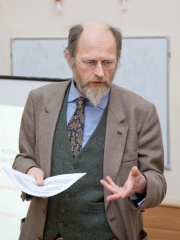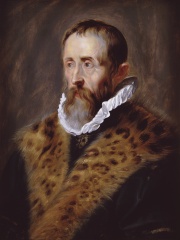
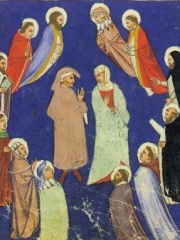

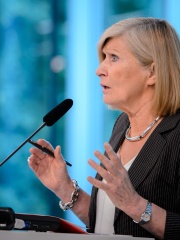

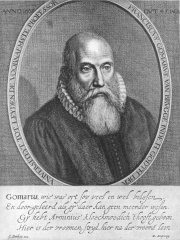
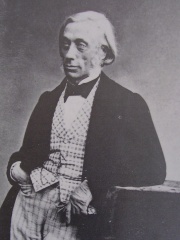

The Most Famous
PHILOSOPHERS from Belgium
This page contains a list of the greatest Belgian Philosophers. The pantheon dataset contains 1,267 Philosophers, 11 of which were born in Belgium. This makes Belgium the birth place of the 19th most number of Philosophers behind Ukraine, and Canada.
Top 10
The following people are considered by Pantheon to be the top 10 most legendary Belgian Philosophers of all time. This list of famous Belgian Philosophers is sorted by HPI (Historical Popularity Index), a metric that aggregates information on a biography's online popularity. Visit the rankings page to view the entire list of Belgian Philosophers.

1. Justus Lipsius (1547 - 1606)
With an HPI of 69.44, Justus Lipsius is the most famous Belgian Philosopher. His biography has been translated into 28 different languages on wikipedia.
Justus Lipsius (Joest Lips or Joost Lips; October 18, 1547 – March 23, 1606) was a Flemish Catholic philologist, philosopher, and humanist. Lipsius wrote a series of works designed to revive ancient Stoicism in a form that would be compatible with Christianity. The most famous of these is De Constantia (On Constancy). His form of Stoicism influenced a number of contemporary thinkers, creating the intellectual movement of Neostoicism. He taught at the universities in Jena, Leiden, and Leuven.

2. Siger of Brabant (1240 - 1284)
With an HPI of 68.25, Siger of Brabant is the 2nd most famous Belgian Philosopher. His biography has been translated into 28 different languages.
Siger of Brabant (Sigerus, Sighier, Sigieri or Sygerius de Brabantia; c. 1240 – before 10 November 1284) was a 13th-century philosopher from the southern Low Countries who was an important proponent of Averroism.

3. Luce Irigaray (b. 1930)
With an HPI of 68.14, Luce Irigaray is the 3rd most famous Belgian Philosopher. Her biography has been translated into 43 different languages.
Luce Irigaray (born 3 May 1930) is a Belgian-born French feminist, philosopher, linguist, psycholinguist, psychoanalyst, and cultural theorist who examines the uses and misuses of language in relation to women. She is considered one of the founders of French difference feminism. Irigaray's first and most well known book, published in 1974, was Speculum of the Other Woman (1974), which analyzes the texts of Freud, Hegel, Plato, Aristotle, Descartes, and Kant through the lens of phallocentrism. Irigaray is the author of works analyzing many thinkers, including This Sex Which Is Not One (1977), which discusses Lacan's work as well as political economy; Elemental Passions (1982) can be read as a response to Merleau‐Ponty's article “The Intertwining—The Chiasm” in The Visible and the Invisible, and in The Forgetting of Air in Martin Heidegger (1999), Irigaray critiques Heidegger's emphasis on the element of earth as the ground of life and speech and his "oblivion" or forgetting of air. Irigaray employs three different modes in her investigations into the nature of gender, language, and identity: the analytic, the essayistic, and the lyrical poetic. As of October 2021, she is active in the Women's Movements in both France and Italy.

4. Chantal Mouffe (b. 1943)
With an HPI of 67.40, Chantal Mouffe is the 4th most famous Belgian Philosopher. Her biography has been translated into 32 different languages.
Chantal Mouffe (French: [muf]; born 17 June 1943) is a Belgian political theorist, teaching at University of Westminster. She is best known for her and Ernesto Laclau's contribution to the development of the so-called Essex School of discourse analysis. She is a strong critic of deliberative democracy and advocates a conflict-oriented model of radical democracy.

5. Arnold Geulincx (1624 - 1669)
With an HPI of 62.94, Arnold Geulincx is the 5th most famous Belgian Philosopher. His biography has been translated into 24 different languages.
Arnold Geulincx (Dutch pronunciation: [ˈɑrnɔlt ˈxøːlɪŋks]; 31 January 1624 – November 1669), also known by his pseudonym Philaretus, was a Flemish philosopher, metaphysician, and logician. He was one of the followers of René Descartes who tried to work out more detailed versions of a generally Cartesian philosophy. Samuel Beckett cited Geulincx as a key influence and interlocutor because of Geulincx's emphasis on the powerlessness and ignorance of the human condition.

6. Henry of Ghent (1217 - 1293)
With an HPI of 61.97, Henry of Ghent is the 6th most famous Belgian Philosopher. His biography has been translated into 21 different languages.
Henry of Ghent (c. 1217 – 29 June 1293), also known as Henricus de Gandavo and Henricus Gandavensis, was a scholastic philosopher who acquired the nickname of Doctor Solemnis (the "Solemn Doctor").

7. Franciscus Gomarus (1563 - 1641)
With an HPI of 61.31, Franciscus Gomarus is the 7th most famous Belgian Philosopher. His biography has been translated into 17 different languages.
Franciscus Gomarus (François Gomaer; 30 January 1563 – 11 January 1641) was a Dutch theologian, a strict Calvinist and an opponent of the teaching of Jacobus Arminius (and his followers), whose theological disputes were addressed at the Synod of Dort (or Dordrecht) (1618–19).

8. Félix Ravaisson-Mollien (1813 - 1900)
With an HPI of 61.25, Félix Ravaisson-Mollien is the 8th most famous Belgian Philosopher. His biography has been translated into 17 different languages.
Jean Gaspard Félix Lacher Ravaisson-Mollien (; French: [ʁavɛsɔ̃ mɔljɛ̃]; 23 October 1813 – 18 May 1900) was a French philosopher, 'perhaps France's most influential philosopher in the second half of the nineteenth century'. He was originally and remains more commonly known as Félix Ravaisson. His 'seminal' 'key' work was De l'habitude (1838), translated in English as Of Habit. Ravaisson's philosophy is in the tradition of French spiritualism, which was initiated by Pierre Maine de Biran (1766–1824) with the essay "The Influence of Habit on the Faculty of Thinking" (1802). However, Ravaisson developed his doctrine as what he called 'spiritual realism' and – according to Ravaisson scholar Mark Sinclair – can be thought of as founding 'the school of contingency'. His most well known and influential successor was Henri Bergson, with whom the tradition can be seen to end during the 1930s; although the 'lineage' of this 'philosophy of life' can be seen to return in the late twentieth century with Gilles Deleuze. Ravaisson never worked in the French state university system, in his late 20s declining a position at the University of Rennes. In 1838, he was employed as the principle private secretary to the minister of public instruction, going on to secure high-ranking positions such as inspector general of libraries, and then the curator of classical antiquities at the Louvre. Later in his life he was appointed as the president of the jury of the Aggregation of philosophy in France, 'a position of considerable influence'. Ravaisson, was not only a philosopher, classicist, archivist, and educational administrator, but also a painter exhibiting under the name Laché.

9. Paul de Man (1919 - 1983)
With an HPI of 60.52, Paul de Man is the 9th most famous Belgian Philosopher. His biography has been translated into 25 different languages.
Paul de Man (; Dutch: [də mɑn]; December 6, 1919 – December 21, 1983), born Paul Adolph Michel Deman, was a Belgian-born American literary critic and literary theorist. He was known particularly for his importation of German and French philosophical approaches into Anglo-American literary studies and critical theory. Along with Jacques Derrida, he was part of an influential critical movement that went beyond traditional interpretation of literary texts to reflect on the epistemological difficulties inherent in any textual, literary, or critical activity. This approach aroused considerable opposition, which de Man attributed to "resistance" inherent in the difficult enterprise of literary interpretation itself. After his death, de Man became a subject of further controversy when his history of writing pro-Nazi and anti-Jewish propaganda for the wartime edition of Le Soir, a major Belgian newspaper during German occupation, came to light.

10. Alice von Hildebrand (1923 - 2022)
With an HPI of 52.85, Alice von Hildebrand is the 10th most famous Belgian Philosopher. Her biography has been translated into 18 different languages.
Alice Marie von Hildebrand, GCSG (née Jourdain; 11 March 1923 – 14 January 2022) was a Belgian-born American Catholic philosopher, theologian, author, and professor. She taught philosophy at Hunter College for 37 years. She was also the second wife of Dietrich von Hildebrand.
People
Pantheon has 11 people classified as Belgian philosophers born between 1217 and 1963. Of these 11, 3 (27.27%) of them are still alive today. The most famous living Belgian philosophers include Luce Irigaray, Chantal Mouffe, and Michel Weber. The most famous deceased Belgian philosophers include Justus Lipsius, Siger of Brabant, and Arnold Geulincx.
Living Belgian Philosophers
Go to all RankingsLuce Irigaray
1930 - Present
HPI: 68.14
Chantal Mouffe
1943 - Present
HPI: 67.40
Michel Weber
1963 - Present
HPI: 49.69
Deceased Belgian Philosophers
Go to all RankingsJustus Lipsius
1547 - 1606
HPI: 69.44
Siger of Brabant
1240 - 1284
HPI: 68.25
Arnold Geulincx
1624 - 1669
HPI: 62.94
Henry of Ghent
1217 - 1293
HPI: 61.97
Franciscus Gomarus
1563 - 1641
HPI: 61.31
Félix Ravaisson-Mollien
1813 - 1900
HPI: 61.25
Paul de Man
1919 - 1983
HPI: 60.52
Alice von Hildebrand
1923 - 2022
HPI: 52.85
Overlapping Lives
Which Philosophers were alive at the same time? This visualization shows the lifespans of the 3 most globally memorable Philosophers since 1700.

